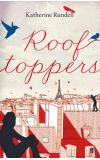
18 May 2013 16:56:58
Good-hearted and generally polite, Sophie has a stubborn streak, refusing to accept that her mother – never officially identified – drowned when the Queen Mary sank. Not only does Sophie insist that she is still alive, she claims to know that she was a cello player in the ship's orchestra. When the NCA inform Charles that Sophie is to be removed to an orphanage, the pair go on the run, heading for Paris, to trace the cello maker whose address they have discovered inside Sophie's cello case. So begins the fairytale quest for Sophie's mother, a search which leads, unexpectedly, to the Parisian rooftops.
Katherine Rundell's charmingly lyrical style is dotty in the way Charles is dotty. In the London section she seems interested mainly in conversations, which have a high quota of witticism (wearing a skirt, Sophie looks as if she's "mugged a librarian") and aphorisms (lawyers have all "the decency and courage of lavatory paper"). In general, her metaphors are determinedly original. Such verbal showiness, though entertaining, has the disadvantage of showing up the misses as well as the successes, and in the early stages the story has the contrived manner, but not the solidly exciting matter, of a fairytale.
This changes the moment Sophie climbs up through the skylight in her Parisian hotel bedroom to the rooftop above. All her life she has been a keen tree-climber, drawn to heights. Now, standing above the city, she is liberated – and the story is liberated with her. Almost immediately she realises she's not alone up there. A feral boy called Matteo lives on the roof of the law courts, and the drama of his encounter with Sophie and their subsequent partnership is thrilling. The roof-top world is grittily real, the stuff of broken toes and roasted rat and howling gales. Breaking away from Charles's protection, Sophie finally expresses the Pippi Longstocking-like wilfulness only coyly hinted at before. Even the showy metaphors thin out. There's a gripping journey of exploration, an extraordinary feast and a tremendous fight between Sophie, Matteo and their tree-dwelling friends and a wolf-like pack of boys from the station area. Even better, there's Sophie's struggle to find the courage to endure and succeed as she tries to find the source of the strange cello music floating up from somewhere in the sleeping city.
Among the rooftops, her fairytale reaches maturity. The witticisms are finally replaced by hard-won knowledge. Love and courage turn out to be two words for the same thing. Sophie learns to value and retain the strangeness she was born with and, in holding on to her child's ability to believe in the extraordinary, to "never ignore a possible".

